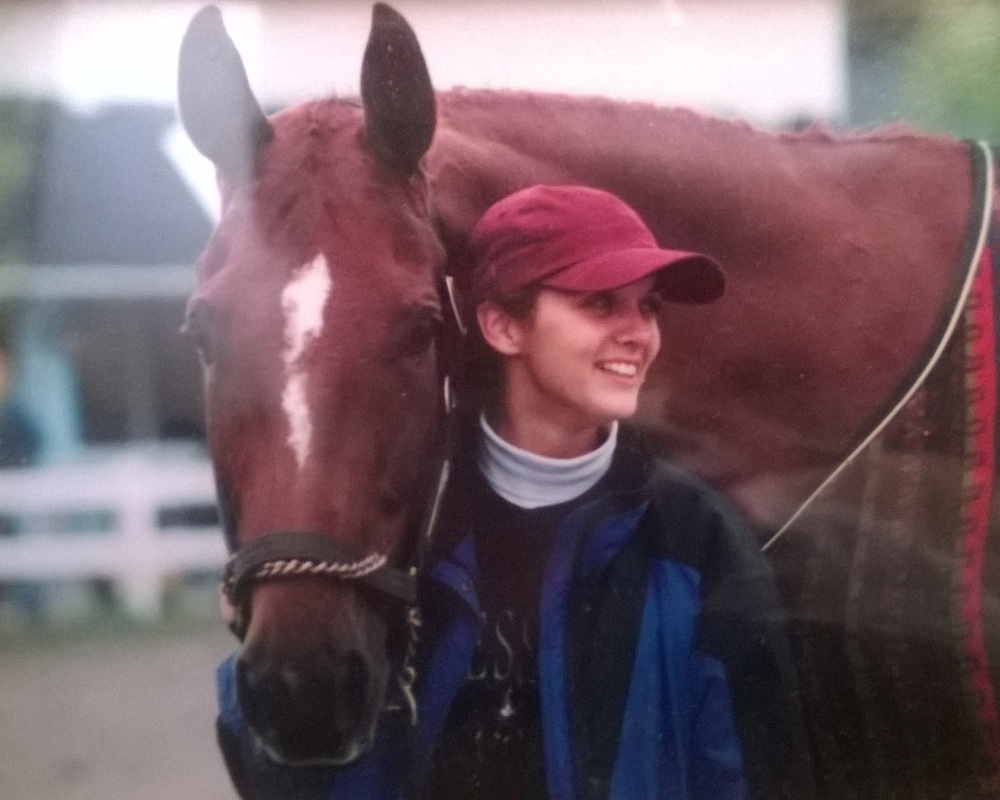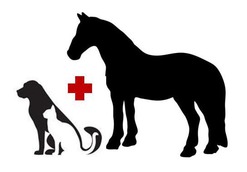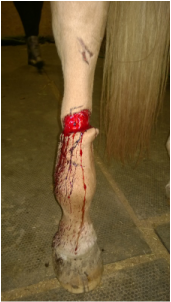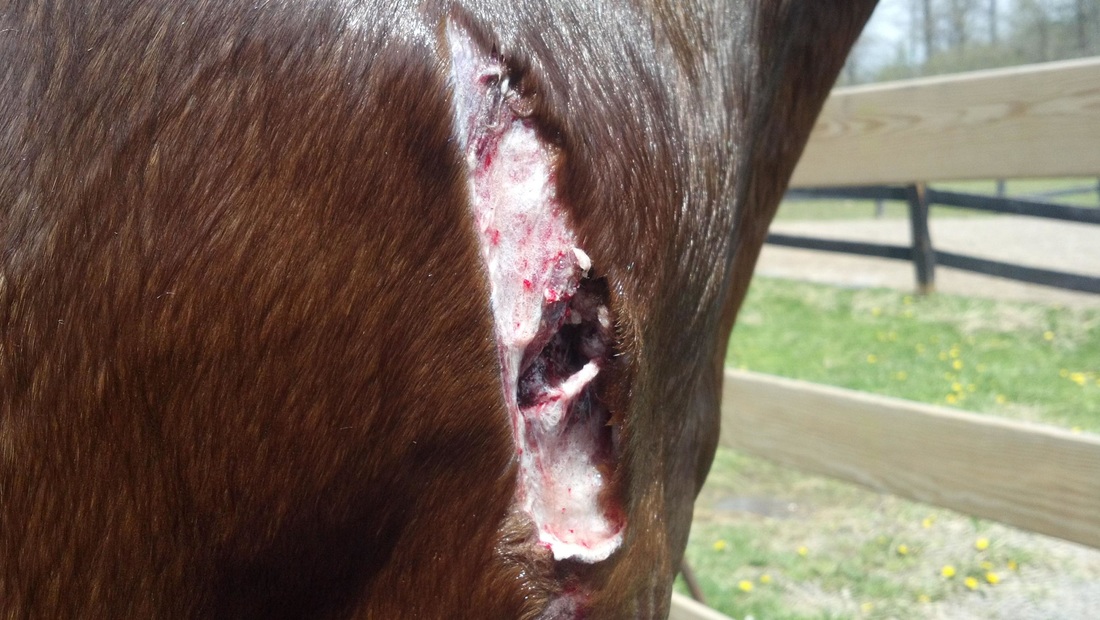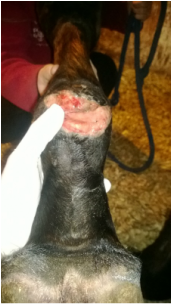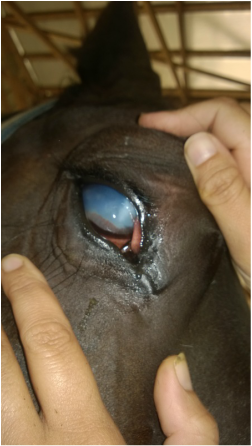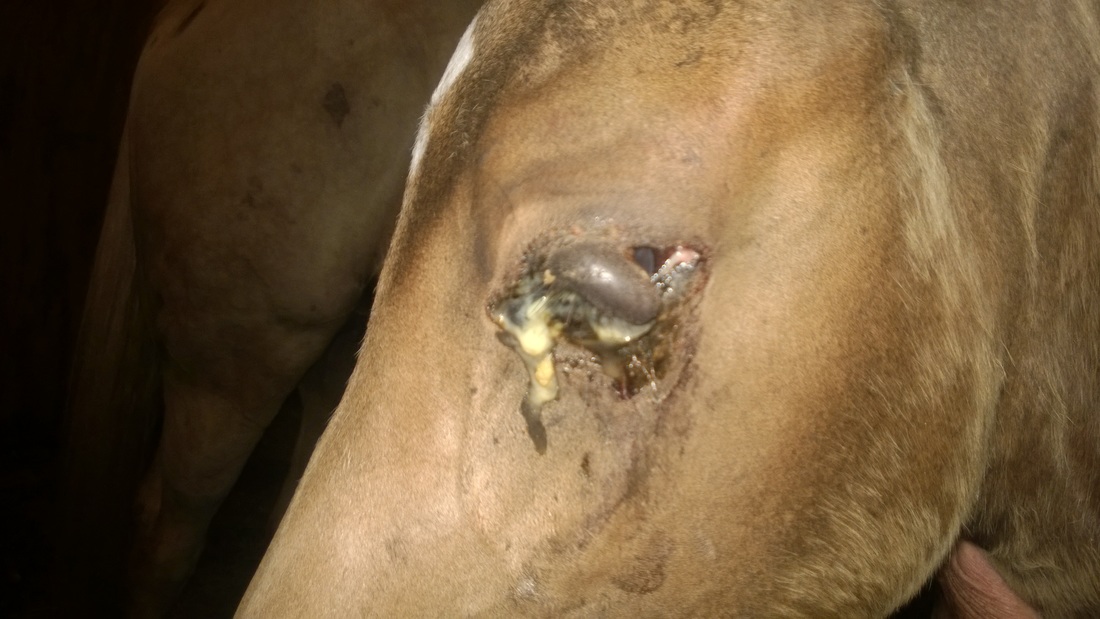by Amy Ortez, DVM
|
|
EMERGENCY OR URGENCY
by Amy Ortez, DVM
Horses have been evolving for 50 million years yet their ability to hurt themselves could make one question both the merits of evolution and intelligent design simultaneously. When you come home from work and you find your horse is not how you left them, what do you do? Is this truly an emergency or can it wait until the morning? Here is a list of the more common urgent or emergency situation.
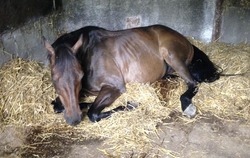
Colic
Colic is the broad term used to describe abdominal pain. Horse's show pain by not eating when fed, is pawing uncharacteristically at the ground, kicking at their belly or giving the Flehmen response (curling the upper lip). If your horse is not eating it's normal food, DO NOT trying giving him apples, carrots, or a hodgepodge of other foods to coerce them to eat. The anorexia is not the problem, the problem is they do not feel well. When they feel better, they will eat. Any time a horse is showing abdominal pain, you should call the veterinarian. Do this as soon as you know something is amiss. Do not wait until 11:00 at night to tell them they have been acting irregular since you came home at 6 o'clock. On behalf of all veterinarians who see emergencies, I beg this of you. While waiting for the vet, hand walking is acceptable. If the horse is laying down quietly, there is no need to force them to stand and walk. Lunging them to trot or canter is also not needed. Just allow them to be quiet, either laying down or walking. They can drink water if they desire, but do not feed them anything. Remember, horses will show similar pain responses to impactions, displacements and other abdominal pain so just because a vet recommended a horse be lunged in the past, does not mean that it should be lunged in every situation. Wait for the veterinarian's direction.
Colic is the broad term used to describe abdominal pain. Horse's show pain by not eating when fed, is pawing uncharacteristically at the ground, kicking at their belly or giving the Flehmen response (curling the upper lip). If your horse is not eating it's normal food, DO NOT trying giving him apples, carrots, or a hodgepodge of other foods to coerce them to eat. The anorexia is not the problem, the problem is they do not feel well. When they feel better, they will eat. Any time a horse is showing abdominal pain, you should call the veterinarian. Do this as soon as you know something is amiss. Do not wait until 11:00 at night to tell them they have been acting irregular since you came home at 6 o'clock. On behalf of all veterinarians who see emergencies, I beg this of you. While waiting for the vet, hand walking is acceptable. If the horse is laying down quietly, there is no need to force them to stand and walk. Lunging them to trot or canter is also not needed. Just allow them to be quiet, either laying down or walking. They can drink water if they desire, but do not feed them anything. Remember, horses will show similar pain responses to impactions, displacements and other abdominal pain so just because a vet recommended a horse be lunged in the past, does not mean that it should be lunged in every situation. Wait for the veterinarian's direction.
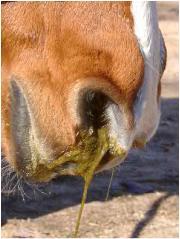
Choke
Some horses are fast eaters, others have dentition problems. After feeding if you find your horse with food material and saliva coming out of his nose, he is probably choking. Sometimes horses also do the move I call the turtle. The horse will try to clear the choke by flexing and relaxing their neck muscles, which reminds me of a turtle popping it's head back into the shell. Choke is an emergency. It is important to clear the choke as quickly as possible to help prevent the horse from aspirating, or inhaling the food material. Call your vet and while you are waiting, try to keep your horse quiet. Do not attempt to force water into your horse's mouth. This may annoy him and cause him to inhale some food or you may inadvertently push water and food into the trachea. If you can keep the horse quiet, preferably with their head down, this is best.
Lacerations
Not all lacerations are created equal. Superficial cuts that are not bleeding excessively could probably be seen during regular business hours. Wounds that are deep, bleeding profusely or are showing bone, tendons, ligaments, etc. (i.e. their insides are showing) should be seen immediately. Unless you have a dog, feel free to throw away the hydrogen peroxide. It disrupts all cells, even the healthy ones. Most superficial wounds can be treated with mild soap and water. Deeper wounds should wait for the veterinarian's assessment. Pouring hydrogen peroxide on wounds that involve muscle, tendons or other organs would be detrimental. Hydrogen peroxide should be in every dog owner's cabinet in case they need to induce vomiting, again, after recommended by a veterinarian.
Not all lacerations are created equal. Superficial cuts that are not bleeding excessively could probably be seen during regular business hours. Wounds that are deep, bleeding profusely or are showing bone, tendons, ligaments, etc. (i.e. their insides are showing) should be seen immediately. Unless you have a dog, feel free to throw away the hydrogen peroxide. It disrupts all cells, even the healthy ones. Most superficial wounds can be treated with mild soap and water. Deeper wounds should wait for the veterinarian's assessment. Pouring hydrogen peroxide on wounds that involve muscle, tendons or other organs would be detrimental. Hydrogen peroxide should be in every dog owner's cabinet in case they need to induce vomiting, again, after recommended by a veterinarian.
|
Eye Injuries Eye injuries are always an emergency. It is wonderful to send pictures of the injured eye to you veterinarian so they can determine how soon the eye should be seen. Minor conditions such as a mild discharge may be able to be seen during normal business hours. Other conditions should be seen as soon as possible. The eye is a very complex and delicate structure. It needs to be respected. |
Lameness
Acute lameness that involves horses being reluctant to move should be seen as an emergency. Other more mild, insidious lamenesses may be able to wait. This is a gray zone and a conversation with your veterinarian would be warranted.
It would be nice if horses were always as 'healthy as a horse' but that is not reality. If there is ever a question regarding the severity of a situation, call your veterinarian and tell them what is occurring. Sometimes things are not as bad as they seem. Other times, medical or surgical intervention is needed. Communication between owner and veterinarian is key to getting the horse back to health.
Acute lameness that involves horses being reluctant to move should be seen as an emergency. Other more mild, insidious lamenesses may be able to wait. This is a gray zone and a conversation with your veterinarian would be warranted.
It would be nice if horses were always as 'healthy as a horse' but that is not reality. If there is ever a question regarding the severity of a situation, call your veterinarian and tell them what is occurring. Sometimes things are not as bad as they seem. Other times, medical or surgical intervention is needed. Communication between owner and veterinarian is key to getting the horse back to health.
DISCLAIMER
The information contained on this website is not meant to diagnose, treat, cure, or prevent any disease. Information found on this website
is meant for educational and informational purposes only.
When in doubt, consult your veterinarian.
The information contained on this website is not meant to diagnose, treat, cure, or prevent any disease. Information found on this website
is meant for educational and informational purposes only.
When in doubt, consult your veterinarian.
